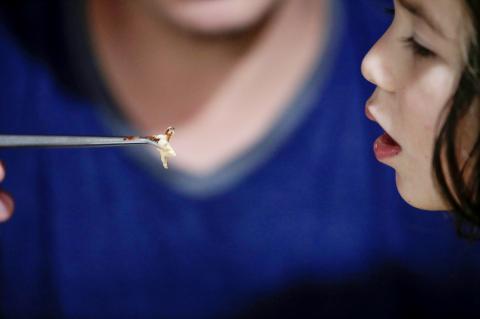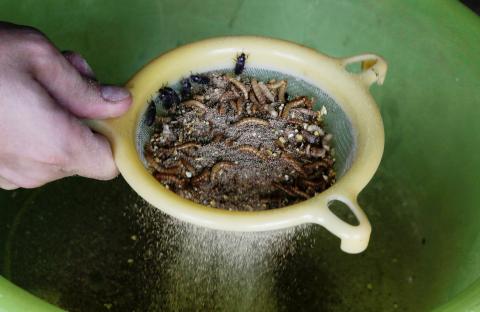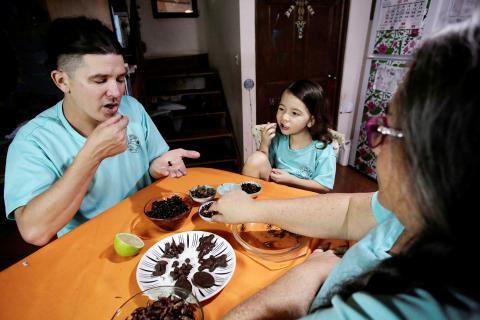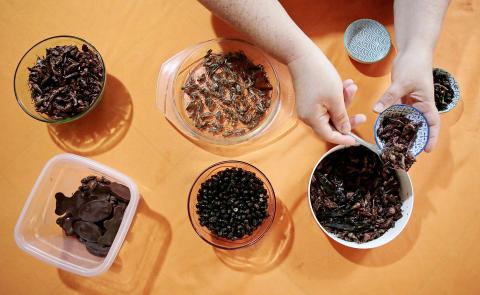At his home in rural Costa Rica, biologist Federico Paniagua joined his family at the dining table to devour several types of insects that he raised on his farm and whose flavor he compares to potato chips.
The head of the University of Costa Rica’s Insects Museum decided three years ago to replace animal protein in his diet with crickets, ants, cockroaches, beetles and other insects — and wants to encourage others to do the same.
“Insects are delicious,” he said in an interview at his farm in Sarchi, about 50 km from the capital San Jose.

Photo: REUTERS
“You can sit and watch a soap opera, watch the football game, do any activity with a plate full of insects. Eat them one by one, with a glass of soda... they’ll go down well,” said Paniagua.
The UN’s Food and Agriculture Organization (FAO) has counted more than 1,900 insect species that are edible.
Especially in Asia and in Africa, the tiny creatures are touted as delicacies packed with vitamins, minerals and energy.

Photo: REUTERS
Their proponents also note that bugs emit fewer greenhouse gases and less ammonia than cattle or pigs and require significantly less land and water than cattle.
Paniagua’s wife, Gabriela Soto, prepared their meal by splashing oil in a frying pan, adding the farm-raised insects and topping them off with a dash of salt.
She then brought out several dishes to her young daughter, who reached into a plate with her hands and munched fearlessly, and husband, who suggested a bit of lemon would enhance their flavor.

Photo: REUTERS
“They are going to taste like potato chips... you can eat basically a whole plate of these insects,” Paniagua said.

Photo: REUTERS

June 23 to June 29 After capturing the walled city of Hsinchu on June 22, 1895, the Japanese hoped to quickly push south and seize control of Taiwan’s entire west coast — but their advance was stalled for more than a month. Not only did local Hakka fighters continue to cause them headaches, resistance forces even attempted to retake the city three times. “We had planned to occupy Anping (Tainan) and Takao (Kaohsiung) as soon as possible, but ever since we took Hsinchu, nearby bandits proclaiming to be ‘righteous people’ (義民) have been destroying train tracks and electrical cables, and gathering in villages

Dr. Y. Tony Yang, Associate Dean of Health Policy and Population Science at George Washington University, argued last week in a piece for the Taipei Times about former president Ma Ying-jeou (馬英九) leading a student delegation to the People’s Republic of China (PRC) that, “The real question is not whether Ma’s visit helps or hurts Taiwan — it is why Taiwan lacks a sophisticated, multi-track approach to one of the most complex geopolitical relationships in the world” (“Ma’s Visit, DPP’s Blind Spot,” June 18, page 8). Yang contends that the Democratic Progressive Party (DPP) has a blind spot: “By treating any

Swooping low over the banks of a Nile River tributary, an aid flight run by retired American military officers released a stream of food-stuffed sacks over a town emptied by fighting in South Sudan, a country wracked by conflict. Last week’s air drop was the latest in a controversial development — private contracting firms led by former US intelligence officers and military veterans delivering aid to some of the world’s deadliest conflict zones, in operations organized with governments that are combatants in the conflicts. The moves are roiling the global aid community, which warns of a more militarized, politicized and profit-seeking trend

This year will go down in the history books. Taiwan faces enormous turmoil and uncertainty in the coming months. Which political parties are in a good position to handle big changes? All of the main parties are beset with challenges. Taking stock, this column examined the Taiwan People’s Party (TPP) (“Huang Kuo-chang’s choking the life out of the TPP,” May 28, page 12), the Democratic Progressive Party (DPP) (“Challenges amid choppy waters for the DPP,” June 14, page 12) and the Chinese Nationalist Party (KMT) (“KMT struggles to seize opportunities as ‘interesting times’ loom,” June 20, page 11). Times like these can